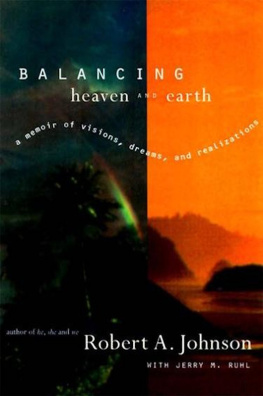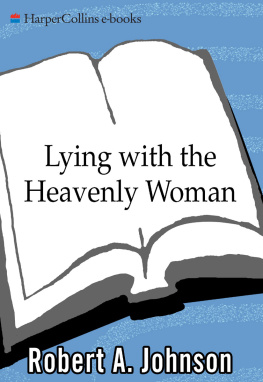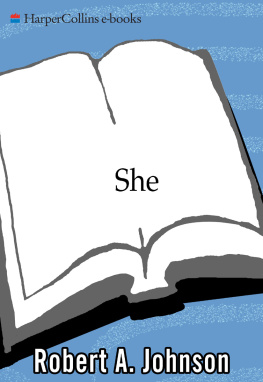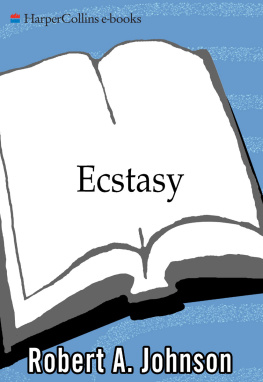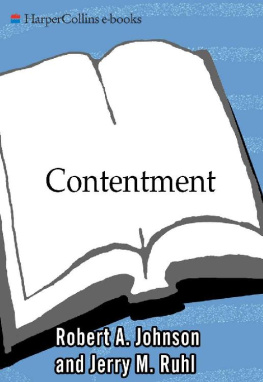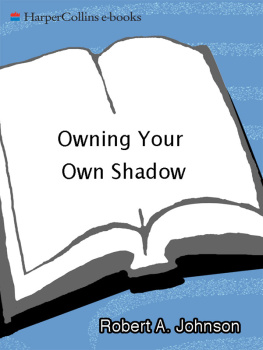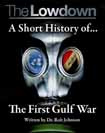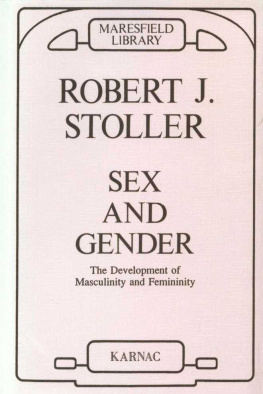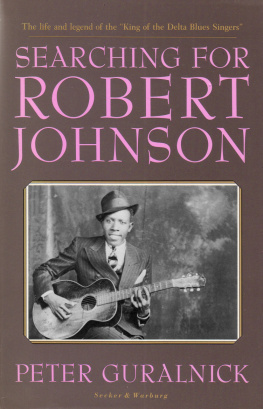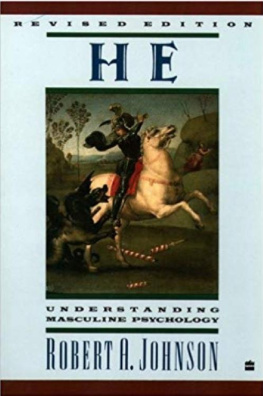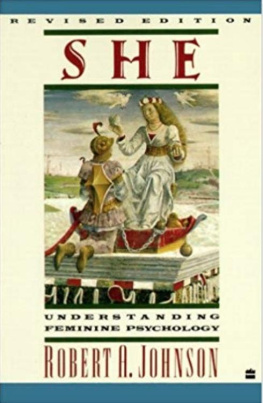Robert A. Johnson - Femininity Lost and Regained
Here you can read online Robert A. Johnson - Femininity Lost and Regained full text of the book (entire story) in english for free. Download pdf and epub, get meaning, cover and reviews about this ebook. year: 2011, publisher: Harper Collins, genre: Romance novel. Description of the work, (preface) as well as reviews are available. Best literature library LitArk.com created for fans of good reading and offers a wide selection of genres:
Romance novel
Science fiction
Adventure
Detective
Science
History
Home and family
Prose
Art
Politics
Computer
Non-fiction
Religion
Business
Children
Humor
Choose a favorite category and find really read worthwhile books. Enjoy immersion in the world of imagination, feel the emotions of the characters or learn something new for yourself, make an fascinating discovery.

- Book:Femininity Lost and Regained
- Author:
- Publisher:Harper Collins
- Genre:
- Year:2011
- Rating:3 / 5
- Favourites:Add to favourites
- Your mark:
- 60
- 1
- 2
- 3
- 4
- 5
Femininity Lost and Regained: summary, description and annotation
We offer to read an annotation, description, summary or preface (depends on what the author of the book "Femininity Lost and Regained" wrote himself). If you haven't found the necessary information about the book — write in the comments, we will try to find it.
Femininity Lost and Regained — read online for free the complete book (whole text) full work
Below is the text of the book, divided by pages. System saving the place of the last page read, allows you to conveniently read the book "Femininity Lost and Regained" online for free, without having to search again every time where you left off. Put a bookmark, and you can go to the page where you finished reading at any time.
Font size:
Interval:
Bookmark:
Femininity
Lost and
Regained
ROBERT A. JOHNSON

The Current Issue
The loss of feminine qualities and energy is an urgent psychological issue in modern society. It is a painful concern in the emotional lives of both men and women. This loss of something so essential for a woman forces her to question her femininity. It crystallizes the long historic debate about the position of women in society. The loss of feminine energy for a man is less obvious, but it curtails the emotional depths of his personality and is the source of much of his discontent, loneliness, sense of meaninglessness, and moodiness. It is a shock for a man to discover that his moods and much of his feeling nature are feminine! To be overtaken by a mood is to be overwhelmed by the inner feminine aspect of his character, and it is only by understanding and embracing this femininity that he can clearly understand his masculine nature. The loss or damage of inner feminine qualities affects our emotional well-being, directly modifying our happiness and contentment. If the feminine qualities are in good order, a person will feel safe and secure.
In understanding that femininity is not the prerogative of the female, our first task is to school ourselves to think of it as an entity that affects a womans central feminine identity and affects a mans ability and capacity for feeling and valuing.
It would be easier to understand this vital dimension if our language were not so sexist and bankrupt. We lack terms for the feminine aspect of life that are multifaceted and rich. Languages often have several terms to describe the elements of a culture that are highly regarded. Conversely, if a language has few terms or a single one to describe an element of its cultural life, then low regard or value is sometimes indicated. For example, Sanskrit, the basis for most East Indian languages, has ninety-six terms for love. Ancient Persian has eighty, Greek has four, English only one. English does not have the breadth, scope, and differentiation for the feminine and for feeling experiences of Sanskrit and Persian. If it did, then we would have a specific word to use in our appreciation of father, mother, sunset, wife, house, mistress, or God. Having only one word to apply to these many levels of experience makes it difficult to understand the complexity of our inner lives and emotions. The Eskimo language has thirty words for snow. This reflects the need for clarity in a complex relationship to snow. When we are as interested in relationship and femininity as the Eskimo is in snow, we will evolve a differentiated and focused language for that dimension of our lives.
The mythologist Joseph Campbell tried to enlarge our discussion of femininity by invoking the following terms:
the left, the side of the heart, the shield side, has been symbolic, traditionally and everywhere, of the feminine virtues and dangers: mothering and seduction, the tidal powers of the moon and substances of the body, the rhythms of the seasons: gestation, birth, nourishment, and fosterage; yet equally malice, and revenge, irrationality, dark and terrible wrath, black magic, poisons, sorcery, and delusion; but also fair enchantment, beauty, rapture, and bliss. And the right, thereby, is of the male: action, weapons, hero-deeds, protection, brute force, and both cruel and benevolent justice; the masculine virtues and dangers: egoism and aggression, lucid luminous reason, sunlike creative power but also cold unfeeling malice, abstract spirituality, blind courage, theoretical dedication, sober, unplayful moral force.
Language forms our thought even when we think we are being open-minded. A friend of mine was preparing her final paper for the course work before ordination as an Episcopal priest. A daemon got into her and she decided to write from an entirely feminine perspectivethis in the face of the rigid patriarchal structure of the church. Her friends advised strongly against this move, but she persevered. She wrote:
As a woman, writing a personal statement, I have chosen to use the term woman throughout this paper, but I wish it clearly understood that in this paper the term woman includes men as well, with no intention to exclude the male gender (except where the context clearly so indicates)either from my understanding of theological anthropology and the nature of the church or, particularly, from the saving work of Jesus Christ. This is not done in complete innocence, of course. In part, I am attempting to reverse, for myself and my readers, the experience of reading theology, which claims to include my gender but seldom does so.
Writing on the theological notion of the person, she said:
My sense of human nature is that woman is a finite creature (created being of God), who is rational, spiritual, imaginative, and creative, or, as the Book of Common Prayer has it, blessed with memory, reason, and skill. She has free will (limited, but real) and potential to become a true child of God, transcending herself as she matures. In understanding her theologically, we must continually struggle to maintain a balance between her spiritual nature and her material nature, which has sometimes been over-spirit ualized by faith communities. Her goal is to love: herself, other women, and more importantly, God.
I think we get the best picture of the purposes for which woman was created and the possibilities in her nature in the person of Jesus. We can only properly understand who woman is after seeing who Christ is, because only in the light of the cross can we see the actual sinfulness of woman, as well as her potential destiny.
Of all the created creatures we can see on earth, woman alone (as far as we know) has the power of reason and memory.
Further, there is in woman (preeminently seen in Jesus) what Karl Rahner calls transcendental, the psalmist calls a little lower than the angels, and Genesis calls in the image of God.
The word men, meaning all mankind, in our scriptures and elsewhere has long subjected us to distortion. The semantic weight is toward maleness no matter what effort we make to include women in the term men.
We must search out this elusive qualityfemininityand find something of its history, even given our paucity of language. Two attitudesone Greek, the other Hinduwill help us understand the roots of femininity in modern civilization. The myth of Oedipus carries the Greek point of view, our immediate heritage; the myth of Nala and Damayanti, from the Mahabharata, conveys the East Indian attitude.
Our Western attitudes toward femininity are so deeply ingrained that it is impossible to gain perspective on them without going entirely outside our own culture. It was my journeys to India that wakened me to a vastly different outlook on everything feminine. The feeling tone, the valuation of femininity, occupy infinitely high places in the East Indian ethos. Just to walk on a street in traditional India is to walk in valid feeling. To experience as Indians do colors, tempi, sounds, sensuousness, relatedness, modesty, and timelessness is to be reminded of the Divine Feminine.
Our Western heroic achievements are the envy of the rest of the world, but they were won at the cost of our capacity for warmth, feeling, contentment, and serenity. We are so rich in things and so poor in feminine values! I saw peace and happiness in the most unexpected places in India! With so little to be happy about, how is it that these people are so contented? At the cost of modern technical accomplishments, they have maintained their feminine values.
The myth of Nala and Damayanti comes strange to Western ears, but that strangeness is the exact quality we need to round out our disastrously one-sided Western way of life. In this East Indian myth, women of strong feminine identity avert disaster. Inescapably, it is feminine strength that is the hero. The Hindu stories simply would not work without the power of their womenthe power of
Next pageFont size:
Interval:
Bookmark:
Similar books «Femininity Lost and Regained»
Look at similar books to Femininity Lost and Regained. We have selected literature similar in name and meaning in the hope of providing readers with more options to find new, interesting, not yet read works.
Discussion, reviews of the book Femininity Lost and Regained and just readers' own opinions. Leave your comments, write what you think about the work, its meaning or the main characters. Specify what exactly you liked and what you didn't like, and why you think so.

